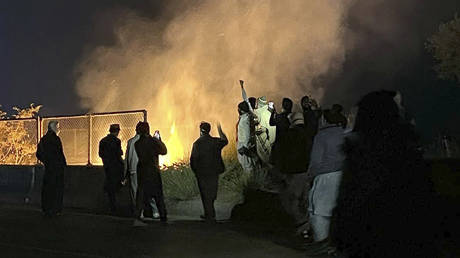Shortly after 5 p.m. on Wednesday evening I was thoroughly convinced that the 2025 Mariners were a team of destiny sent to relieve our collective suffering.
George Kirby needed just 14 pitches to retire the Blue Jays in the first inning, and Julio Rodriguez followed that up with a two-run homer to whip T-Mobile Park into a cauldron of serious decibels.
Then came the horrible, no good, very bad third inning in which Kirby allowed five runs. Suddenly, I was certain that not only had the Mariners squandered the one opportunity they had to reach the World Series, but I was partly responsible. My own unrestrained optimism had somehow befouled the confluence of forces that had been propelling the Mariners for the past month and a half.
As I sat there in my slack-jawed despair, I realized two things simultaneously:
1) I had forgotten how utterly excruciating playoff baseball is when your team is involved;
2) I was utterly unprepared for the mood swings this experience entails.
I suppose this second fact is not entirely my fault. The local baseball franchise has not given us much practice in this regard. When you get to the playoffs twice in the past 24 seasons, it’s easy to forget that while postseason baseball may be governed by the same rules, it might as well be an entirely different sport given the anxiety it evokes.
For the six months of the regular season, we are constantly reminded the game is a marathon and not a sprint. You can’t overreact to one inning or one game or even one week of results. You have to let things play out.
Then you get to the playoffs and every pitch, every inning, every game is a pivotal moment in which I find myself literally pleading, “Come on. Just this once. Please! Let it happen.”
No wonder I woke up on Saturday, the morning after that 15-inning ordeal against Detroit, and felt like I needed to remain horizontal for another hour or four.
Chase that with two straight victories in Toronto, and Seattle was faced with a totally unprecedented situation: The Mariners were in control of an American League Championship Series.
I found this utterly terrifying. I was leery to acknowledge how likely it is for teams that take a 2-0 lead to win a seven-game series for the exact same reason that players don’t talk to a pitcher who’s working on a no-hitter: You don’t want to disrupt in any way whatever it is that’s going on.
Instead, the Blue Jays bats took care of that. After scoring a total of four runs in the first two games, Toronto had plated eight in the first half of Game 3.
By then, I’d decided to lean into the pain. I wanted the Mariners to get it all out of their system. Cough up every run they could, strike out as many times as they wanted. A 20-run loss doesn’t count for any more or any less than any other defeat in a best-of-seven playoff series. It was like Lieutenant Dan in “Forrest Gump” when he perches himself atop the mast of the shrimping boat in the midst of a hurricane: “You call this a storm?”
I realize this wasn’t entirely logical. There’s not a finite number of runs that can be allowed. Giving up a bunch in one game doesn’t make it any less likely a team will give up a bunch of runs in the next one.
The playoffs, however, are not conducive to rational thought.
It is a time of year when we overreact to each and every at-bat and draw sweeping conclusions based on individual outcomes, willfully overlooking all the history that shows blowouts like this don’t mean all that much.
So in an effort to talk myself out of the pit I fell into during Game 3, I turned back to the last year the Mariners made it this far in the playoffs: 2001.
Seattle faced Cleveland in the divisional series that year. The teams split the first two games, which were played in Seattle, and went back to Cleveland where the Mariners were drubbed 17-2 in Game 3.
That remains the largest playoff loss in Mariners history, and I remember just how grim things felt. The assumption was that the bottom had dropped out of what was—up to that point—the greatest season in franchise history.
All Seattle did was win the next two games to advance to the American League Championship Series where the Mariners faced the Yankees.
We all know what happened next, but you might not remember exactly how it happened.
Seattle had home-field advantage in the 2001 ALCS just like Toronto does this year.
The Mariners offense sputtered in the first two games of that 2001 series just as Toronto did this year.
When the series went back to New York, the Mariners fell behind 2-0 after the first inning of Game 3 before clobbering their way back into not just the game but the series.
I was in the Bronx that night out in right field when the Mariners won 14-3, and I remember feeling so certain that the Mariners had turned the tide of the series. I was in that same spot the following evening when the Yankees won 3-1 on a walk-off homer by Rafael Soriano and the following evening when the bottom fully fell out for Seattle during a 12-3 loss.
Back then, it was a gut punch. Today, it’s a reminder that there’s a long way to go in this series, and (hopefully) this season.
It’s the playoffs, which means it’s going to be excruciating.
Danny O’Neil was born in Oregon, the son of a logger, but had the good sense to attend college in Washington. He’s covered Seattle sports for 20 years, writing for two newspapers, one glossy magazine and hosting a daily radio show for eight years on KIRO 710 AM. You can subscribe to his free newsletter and find his other work at dannyoneil.com.





